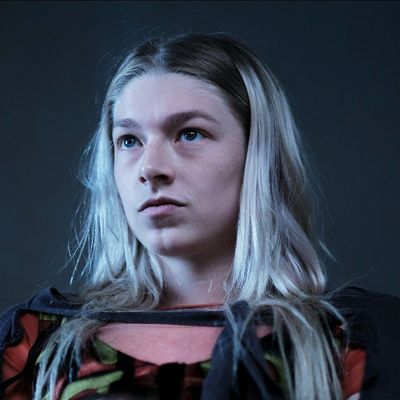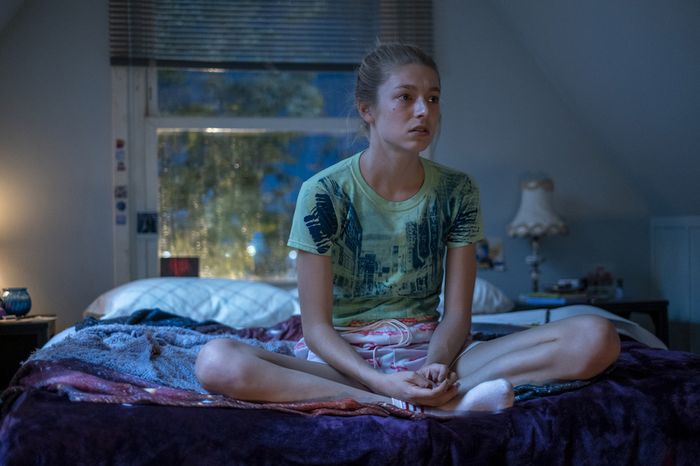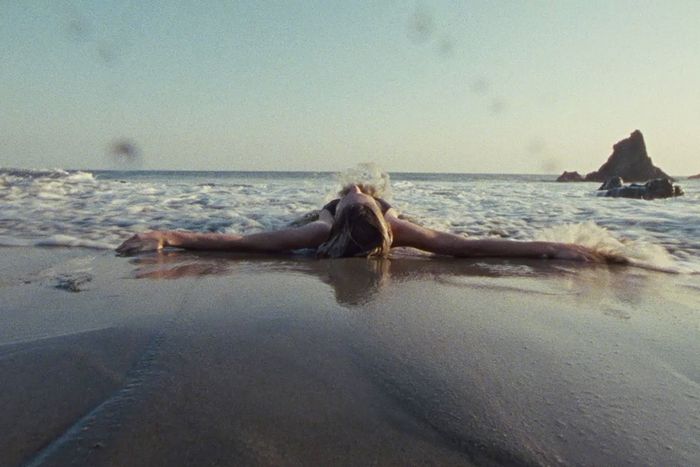
Last winter, after the pandemic postponed the filming of Euphoria’s second season, HBO surprised fans of its smash hit with two “special episodes,” both of which are pared down and more intimate than the series’s usual Technicolor, rapid-fire teen chaos. Each episode takes place a few weeks after the show’s protagonist, Rue (Zendaya), and her best friend–(ex?) love interest, Jules (Hunter Schafer), part dramatically at a train station at the end of season one. Both spend time parsing and unpacking that moment — and its emotional aftermath — without giving away what may unfold in season two (which is filming now). But Jules’s episode functions on another level, doubling back and replaying much of the first season through her eyes (at one point, literally), giving us new information about her backstory that we aren’t privy to in season one.
The episode, titled “Fuck Anyone Who’s Not a Seas Blob,” engages unflinchingly with themes ranging from Jules’s suicidal ideation to her being catfished and sexually exploited to her evolving understanding of her gender performance and its inextricable link to male desire. The compounding traumas might have felt overwrought without Schafer’s performance, which anchors the whole thing in reality: Her face crumples and expands, her body curling in on itself as she allows herself to be equal parts vulnerable and self-protective. Schafer co-wrote and co-produced the episode alongside series creator Sam Levinson — both things she had never done before — most of which the pair accomplished spontaneously over the phone during quarantine.
Schafer has spoken at length about how Levinson has allowed her to shape Jules, blending her character’s backstory and personality with her own. This makes the episode, a possible Emmy contender, feel in some ways as if we’re getting a line to Schafer’s own roiling thoughts. She Zoomed me from a hotel room in classically Jules-esque eye makeup (tiny pearls lined up in a V-shape along the inner corner of her eyes) to tell me the whole story about how the episode came together — including her cross-country conversations with Levinson, how writing it kept her from checking into a mental hospital, Torrey Peters’s Detransition, Baby, and what, exactly, “Fuck Anyone Who Is Not a Sea Blob” means.
Tell me about your amazing eye-makeup situation.
My makeup artist is here, and we’re always figuring out new things to do. But we got a little pearl gradient moment going on. For press things, we like to be in the work zone.
How did this episode come together during quarantine? What were you doing before you and Sam started talking about putting it together?
It all fell together in a funny way. The beginning of quarantine left me scrambling for things to keep myself occupied within the sudden isolation. I’d been curious about screenwriting for a bit and did a little studying on my own. I took Shonda Rhimes’s MasterClass and was writing a script with my friend, and Sam and I are in constant communication, exchanging ideas and songs and whatever. Eventually, he started tossing around the ideas of these special episodes that are more contained and more feasible for filming within a pandemic, particularly with what he’d learned by filming Malcolm & Marie. So he came into these episodes knowing how that worked. It became a really beautiful opportunity to do these check-ins and character studies of Rue and Jules.
At what point did you decide you would write and co-produce Jules’s episode?
We started having conversations about where Jules was at and what we might want to say. And we discovered that Rue is not always the most reliable narrator. I’ve been pretty involved in Jules’s development and her character from the beginning, and within our conversations, Sam pointed out that some of the stuff we were talking about sounded like dialogue. He offered, “Would you be interested in writing this with me?” And, of course, I was like, “Hell, yes. Absolutely. That would be a dream.” With that, we had a first draft within a week. It kept evolving from there.
On The Tonight Show, you spoke a bit about how the episode was so cathartic for you it kept you from checking in to a mental hospital. How did writing it function for you in that way, keeping you sane?
Something else I realized sitting with myself in quarantine in between season one and these episodes is that, without realizing it, I had developed a pretty solid dependence on the catharsis that acting provides, particularly with this character, just because I feel so close with her. She became a vehicle for working through things I was thinking about at her age and haven’t finished processing. So it was therapeutic in that way.
You’ve said before that you feel as if people sometimes conflate you and Jules. Does that bug you?
There’s definitely truth in the fact that it gets a little blurry between who I am and who she is. But that’s also changed. I was 19 when I first began inhabiting Jules, and I’m 22 now, nearly a completely different person than when we first started. A lot has happened since then, and I’ve experienced a lot and I’ve grown, versus the time capsule Euphoria lives in. [Starts whispering off-camera] Can I say … timeline things? No. Okay. Never mind!
She’s still in high school. When I first started with her, we were much more parallel then than we are now because I’ve had a lot of growth — not that Jules hasn’t as well, but we’ve gotten to know her better as a character and where she’s moving. And I’m getting to know myself better and know where I’m moving. They diverge and intersect. And in that way, it can be complicated, but it’s nice to understand the dichotomy a bit better than when we first started.
Is it more difficult to get into the headspace of Jules now that you’re diverging, whether you’re writing for her or inhabiting her?
Sam taught me how to act from the ground up; same thing with writing. For a long time, Euphoria’s were the only scripts I’d ever read, and they’re still the only scripts I’ve gotten through the full production process with. So I don’t have much to compare it to, but no — if anything, it’s gotten easier. But that’s due to the amount of time I’ve spent with her. [Working on] the pilot, in which I was still figuring out who she is, versus spending nine months filming season one with her. By the end of the season, it was like [snaps fingers].
There are a lot of hyperspecific, intense themes threaded throughout the episode. Jules talks about gender performance, suicidal ideation, her strained relationships with Rue and with her mother, sex, exploitation, and dark fantasy. How did you and Sam narrow it down and figure out how to put it all together into a 50-minute episode?
I think it’s pretty evident by the end of season one that Jules has had a rough introduction to her new school and social environment, aside from the sweet relationship she has with Rue and a little bit with Kat. Everything in season one — this girl has been through it. It felt necessary to readdress some of those things. We move very fast on the show; new things are constantly happening. It felt cathartic to revisit the things we might have moved on from otherwise. It provided a check-in with where she’s at as a human being, rather than someone who’s engaging in a confusing romantic relationship or still dealing with the heartbreak of a boy who catfished her. As I’m someone who cares deeply about Jules, it makes me feel hopeful for her. You can’t just move on from those things right away.
When I was rewatching the episode, I was struck by some of the similarities between Jules’s regenerating ideas about beauty and gender performance and those in the book Detransition, Baby. Have you read it?
Ooh, no. What is this? [Writes down the title.]
Well, Torrey Peters, the writer, actually just wrote an essay about you and this topic. Did you see it?
No, I didn’t!
Can I read you a small section from it?
Yes!
It’s about how watching you changed her ideas about beauty.
Oh, I did see this. It was such a sweet article.
What did you make of these sort of dovetailing ideas about detransitioning and reevaluating the concept of femininity, specifically as something not tailored for male consumption?
I actually can’t remember if Jules says the word detransitioning in the episode.
Yeah, the therapist uses that word.
Yes, yes. And then Jules says, “Well, not everything, maybe just my blockers.” That’s sort of following the conversation she had with Anna in episode seven about how she navigates femininity and her reliance upon men and hookups in order to affirm that, when, in reality and in her hopes, femininity is a million things more than that. She still has so much more to discover about herself and about existing as a feminine person but not necessarily adhering to what it means to be feminine from a cisgender vantage point. That being feminine can be whatever you want it to be as long as it’s true to you. That’s something we were thinking a lot about for Jules.
You can even see it happening in season one, compared to where we start off in the pilot, where she’s dressed in all of these hyperfemme, hypersexualized baby-doll looks, into something more androgynous and slightly darker and more reflective of her actual headspace. That, in a lot of ways, is more feminine, in that it’s not a mask but a vulnerable look inside where she’s at.
I read something you wrote on Instagram back in 2018: “My gender was so influenced by a need to be used by men.” And now, three years later, this is something you’ve written into Jules’s thought process. She says, “I’ve framed my entire identity around men, when in reality I’m not interested in men philosophically … How the fuck did I spend my entire life building this around what I think men desire? I feel like a fraud.” How has your own evolution influenced Jules’s and made its way into this episode specifically?
Oh yeah, that’s a poem — or, I don’t even know if I can call it a poem, but just a page from my sketchbook. I was 18 or 19 when I wrote that, just confused about my sexual orientation and romantic attractions, which I was definitely also dealing with at Jules’s age. I feel more resolved about these things at this point. Not completely, that spiral never ends. But it’s definitely applicable to Jules, particularly at the beginning of season one, her habits and the toll they take on her. She doesn’t necessarily want to be this way, but this is the way she’s figured out how to find the feeling she’s searching for. She doesn’t know how else to find it yet. That’s a journey we’re following her on — finding that feeling, or even interrogating why she wants that feeling, and finding new ways to find other feelings yielded through other experiences that are just as fulfilling. It can feel cloudy and psychological, in some senses, but that’s why we make it through art versus an essay. It’s hard to put into words sometimes.
Well, I found it incredibly profound.
Thank you.
I know you worked on storyboarding the episode as well. You’ve long been a visual artist and have spoken about your love of fantasy. Can you talk me through coming up with and drawing the nightmarish sexual fantasy sequence with Tyler/Nate and Rue?
Sam and [cinematographer] Marcell [Rév] brought me out two-to-three weeks early. They were gracious enough to let me shadow them in that process and make contributions, which eventually fell under the credits I received for that episode. That was really exciting to me as someone who comes from a visual-arts background and grew up loving comics and costume design — these were things I wanted to pursue before acting was ever in the picture. We were sitting in the writing room, and when it became hard to articulate something or an idea, it was easier for me to pull out my notepad and start illustrating what that looked like with Sam and Marcell. They’d be able to translate and use the storyboards as references for when we actually shot it. In terms of developing a general mood, it was really helpful — and where I needed to be inside my head to film these scenes.
I found the idea of the ocean as a thematic center of the episode, and as a touchpoint for Jules, really moving. She sees the ocean as representing this deep, strong, spiritual, feminine ideal for her. It also speaks to her transness being a spiritual experience. Are these touchpoints for you as well? Those moments feel really personal and relatively new for television.
Yeah, for television, I haven’t seen a monologue quite like that before. I hope the people it was made for identified with it. I received some really lovely, affirming messages from friends and people in the community saying it rang really true to them, which was really affirming. While it may be new for TV, there’s a reason those trans people in my life identified with it: It’s because it’s a very common experience for a lot of trans folks. That’s more important to me than anything else.
Can you talk to me about the genesis of the episode’s title?
Yes! “Fuck Anyone Who’s Not a Sea Blob.” I love it, first of all. It was kind of birthed out of — I remember distinctly laying around in the writing office after a long day of making revisions, and Sam was like, “Oh, shit, we need a title for this episode.” We started tossing around ideas, and a conversation about what animals we identify with wove its way in there. Mine in particular is this little sea blob or sea angel. It’s this gelatinous, beautiful, transparent, glowing thing with wings. I’m like, If I could inhabit a vessel like that … maybe in another life. Wishing you could inhabit another vessel is relative to transness in some ways too, to people who aren’t satisfied with the largely binary, static idea of how to be a human, which is handed to us from the beginning. It’s basically saying, “Fuck anyone who’s not down for that.” But also, low key, everyone is down for that; everyone wants that. So it’s not really fuck anyone. It’s more “Fuck standards.”




